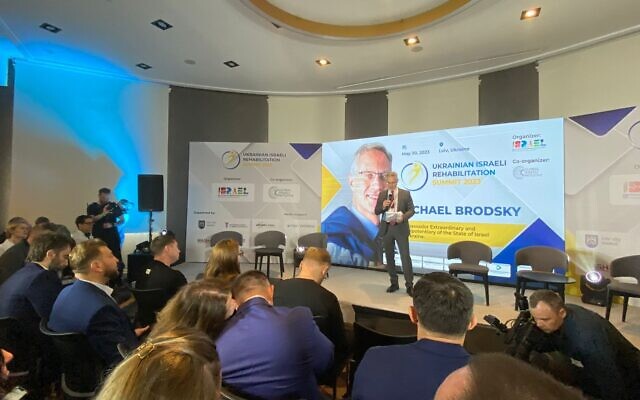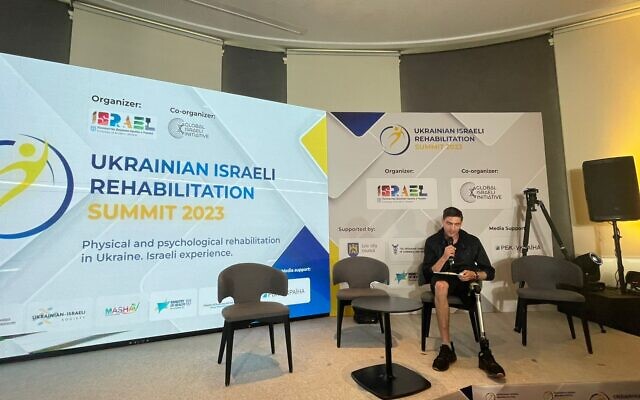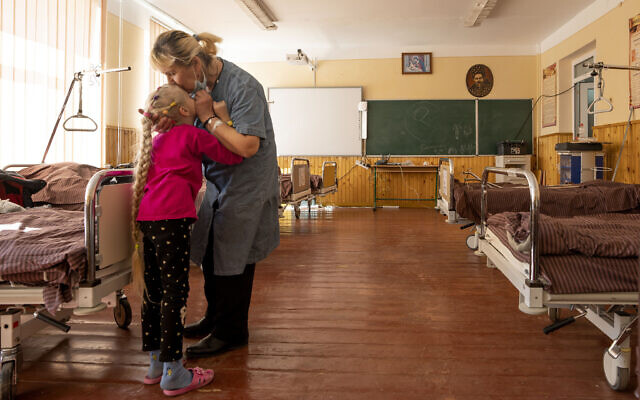Set to expand rehabilitation aid, Israel puts expertise on display in Ukraine
Two-day Lviv conference organized by several Israeli ministries sees doctors, entrepreneurs gather to improve national system for helping soldiers and civilians cope with injuries
Lazar Berman is The Times of Israel's diplomatic reporter

The first Ukrainian-Israeli Rehabilitation Summit opened in Lviv on Tuesday, bringing Israel’s experience in physical and psychological recovery to Ukraine as it continues to fight Russian forces.
The two-day event, organized by Israel’s embassy in Kyiv along with the Health, Welfare, and Economy ministries, and Ukraine’s embassy in Israel, brings together doctors, medical technology professionals, entrepreneurs, and government officials from both countries.
The aim, according to Israel’s embassy, is “to develop a comprehensive plan of physical and psychological rehabilitation of the Ukrainian population.”
US officials estimate that 42,000 Ukrainian civilians have been killed since Russia invaded last February, along with 20,000 soldiers.
The American assessment put the number of wounded Ukrainian troops at 130,000.
The United Nations has recorded lower figures of civilian casualties — 8,895 killed and 15,117 wounded — while adding that actual numbers are likely much higher.
The opening session included video addresses by First Lady Michal Herzog and Foreign Ministry Director General Ronen Levy.
Ukrainian participants include Lviv Mayor Andriy Sadovyi, Lviv state military chief Maksym Kozytskyy, and Yuriy Podolian, deputy chief of the Ukrainian armed forces medical corps.
The second day of the event, which coincides with Lviv City Rehabilitation Day, featured visits to rehabilitation centers, including the Superhumans facility in Lviv.
Doctors from Sheba Medical Center, Ichilov Hospital, and Clalit HMO flew to Ukraine for the conference.

Oleg, a wounded Ukrainian soldier treated in Israel, also addressed the attendees.
Though Israel has not provided Ukraine with the defensive systems it has asked for, it has been active in providing medical and rehabilitation assistance.
Sheba Medical Center ran a field hospital in western Ukraine, away from the front lines, for six weeks shortly after Russia invaded, where 6,200 people were treated.

Wounded Ukrainian soldiers began arriving in Israel for treatment last September, and dozens have been treated so far. In addition, more than 200 Ukrainian professionals have participated in trauma programs in Israel run by MASHAV, Israel’s international development organizations, and thousands more joined online programs.
Israel also donated four armored ambulances, and hundreds of tons of humanitarian equipment.
Jerusalem is “currently looking into expanding our involvement in physical and psychological rehabilitation in Ukraine,” Brodsky told The Times of Israel.
As part of that effort, the possibility of opening an Israeli-run center in Ukraine is being examined.
Israel has turned down requests to send weapons to Ukraine, part of the tightrope it has tried to walk between its interests between Ukraine and Russia.
Russia maintains a military presence in Syria, Israel’s northern and bellicose neighbor. The need to balance security interests at home and policy abroad have produced a relatively restrained response from successive Israeli governments, which have tried to maintain relations with both Moscow and Kyiv.









